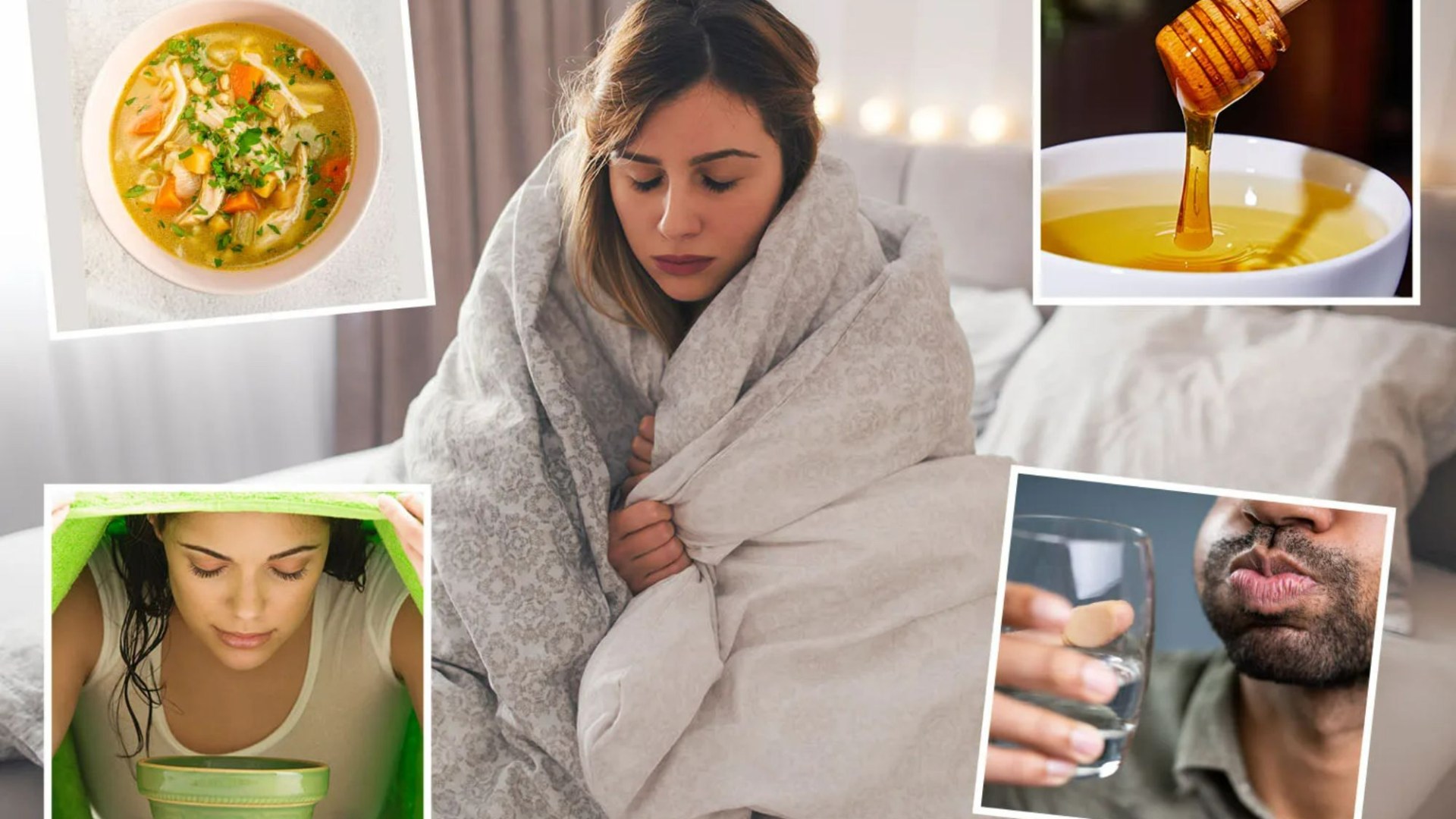THE last few weeks of autumn are dreary for many reasons.
It’s cold, rainy and half of us have picked up some form of winter ailment.
4
In most cases, over-the-counter medicines and sleep can pull you through your bug.
As GP and author Dr Philippa Kaye told Sun Health: “The best thing you can do for a cold or flu is rest, which is completely free.”
But you might be thinking of giving some at-home treatments a go.
From essential oils to honey and chicken soup, we asked GPs to give their verdicts on nine popular home remedies.
READ MORE ON COLD AND FLU
1. Steam inhalation and essential oils
Steam inhalation can help clear nasal congestion, Dr Kaye said.
Meanwhile, Dr Sarah Jarvis, GP and clinical consultant to Patient.info, said she used to recommend the treatment a lot.
What you need to do is pour some hot water into a bowl, lean over it with a towel placed over your head to trap in the steam and breathe normally.
Don’t do this for longer than 10 to 15 minutes and be careful not to burn yourself with the hot water.
Some people choose to add a few drops of essential oils to the liquid.
According to Dr Jarvis, there’s no particular evidence that adding oils to the hot water can make a difference to easing your symptoms, though she said menthol “might help clear your airways slightly”.
Dr Kaye said she wouldn’t recommend one brand over another, though you could try something with menthol or eucalyptus.
But she emphasised that you first need to check with a pharmacist if essential oils are safe to use – especially with children.
Overall, just the steam should be effective, the GP added.
You can also use a humidifier for the same purpose, Dr Kaye went on.
If you don’t want to invest in a device, which can cost around £50, a budget trick would be to pop a bowl of water next to your radiator.
Which cold and flu remedies actually work?

Sun Health reporter Isabel Shaw put 9 well-known cold and flu remedies when she was struck with a lurgy.
Over the course of a week, she tried products that targeted all symptoms associated with cold and flu, as well as treatments that only aimed to get rid of specific issues.
These included:
- Hot honey and lemon
- Steam inhalation and Vicks Vaporub
- Echinacea
- Chicken soup
- A spicy curry
- Beechams All in One Oral Solution
- Strepsils
- Lemsip Max
- Sudafed Blocked Nose Spray
She took into account pain reduction, and how quickly and for how long they worked.
Read her full verdicts here
2. Gargling salt water and nasal irrigation
Gargling salt water is a popular remedy for easing the discomfort and pain of a sore throat, but Dr Jarvis said there’s not a huge amount of evidence that it works.
“Sometimes it may help, and it is recommended by the NHS,” she told Sun Health.
It involves dissolving half a teaspoon of salt into warm water and gargling it at the back of your throat before spitting it out – you don’t want to swallow the mixture.
But Dr Jarvis emphasised that children shouldn’t try this method.
If you have a sore throat, Dr Kaye recommended you suck on ice chips, ice lollies and sugar free boiled sweets.
Nasal irrigation might be helpful for clearing a runny nose or if you have sinusitis, Dr Jarvis added, saying she has recommended the Neilmed sinus rinse.
But you need to be really careful to do this under sterile conditions, she stressed.
Dr Kaye suggested saline nose spray and nose drops for decongestion and loosening mucus.

4
3. Tea with lemon, ginger and honey
Both GPs said honey could be helpful in soothing a sore throat and cough.
But there’s no need to buy expensive varieties like Manuka, Dr Kaye said. The budget stuff, available for 75p in Aldi, will do just fine.
And having hot drinks can help with dehydration and loosening congestion, she added.
But Dr Jarvis emphasised that children under 12 months shouldn’t have honey as it contains bacteria that could produce toxins in a baby’s intestines, leading to a serious illness called infant botulism.
She added that there wasn’t specific evidence that lemon or ginger could help you get over a winter ailment.
4. Apple cider vinegar
Having apple cider vinegar is unlikely to cause harm, but it’s not clear if it’s helpful, Dr Kaye said.
There’s very little evidence that it can ease winter ailments, Dr Jarvis added.
It’s reassuring, as a 946ml bottle of the stuff from Holland & Barrett costs almost a tenner.
5. Chicken soup
“There is some evidence to suggest that chicken soup is better than other hot drinks at easing congestion,” Dr Kaye said.
And Dr Jarvis said the comforting broth may help quickly clear a snotty nose and increase mucus flow – sometimes in just minutes.
This is possibly just down to the fact that it’s warm, though the vitamins and minerals in the garlic, herbs and vegetables could also be the reason you feel a little better after a steaming bowl of the soup.
But it’s not going to cure your symptoms, the GP said.
You can make your own, or pick up a supermarket variety for around £1.75.

4
6. Echinacea
Echinacea is a group of flowering plants used as a popular herbal remedy for the common cold.
But there’s only mixed evidence it works to do this, both GPs said.
It might reduce the length of time for which you’re symptomatic, Dr Kaye conceded.
But Dr Jarvis said scientific evidence for echinacea was weak because it’s difficult to know what strength you’re getting each time.
Some studies may have positive results regarding the remedy due to the strengths they use, she explained.
Echinacea is available in tablet, liquid and spray form, and can cost anywhere from £5 to £25.
Don’t waste your money when you can use rest, fluid, honey and steam
Dr Philippa Kaye
7. Vitamin C, D and zinc
Vitamin C is touted by many as way to quickly get over winter ailments, but there’s mixed evidence over whether the supplement, available for 3p per pill in Boots, actually works.
Research shows that taking it regularly might shorten the period of time for which you’re symptomatic, but starting to take it when you start feeling unwell probably won’t do much to help, both GPs said.
The same goes for vitamin D and zinc too.
8. Extra pillows
Making a nest of pillows can help you breathe a little easier at night if you’re bunged up, Dr Jarvis said.
But for it to work, you need to make sure you’re elevating your torso from the waist up, not just your head.
The GP said doing this might make you cough more at night, as mucus might trickle down your throat and irritate it.
To save spending money on new pillows, why not grab some extra cushions from your sofa?
9. Eating a marshmallow
A TikTok creator recently made rounds on the app for saying that eating a jumbo marshmallow had coated her throat and helped her sleep through the night without coughing.
Both GPs said this was probably down to a placebo effect and that there’s no clinical evidence this works as a remedy.
What’s the best way to get over a cold or flu?

4
If you want to go down the more traditional route, paracetamol and ibuprofen can alleviate a fever and aches.
Over-the-counter cold and flu meds can also do the trick, buy they shouldn’t be given to children under the age of five.
But Dr Kaye advised you to discuss any medicines with your pharmacist prior to taking them.
Meanwhile, decongestants won’t necessarily shorten the period of time you experience symptoms for, but they can provide short term symptom relief.
Dr Jarvis said these shouldn’t be used for longer than three or four days, as you may experience a rebound in symptoms when you stop taking them.
As for cough syrups, Dr Kaye said these aren’t always hugely effective and she recommended you go for honey instead.
“Don’t waste your money when you can use rest, fluid, honey and steam,” Dr Kaye advised.




